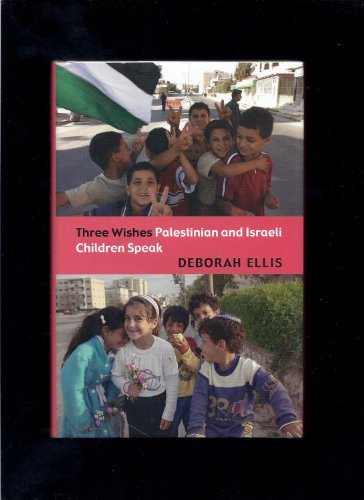Deborah Ellis's enormously popular Breadwinner trilogy recounted the experiences of children living in Afghanistan; now Ellis turns her attention to the young people of the Israeli-Palestinian conflict. After visiting the region to conduct interviews, she presents their stories here in their own words. Twelve-year-old Nora, eleven-year-old Mohammad, and many others speak directly about their lives — which prove to be both ordinary and extraordinary: They argue with their siblings. They hate spinach. They have wishes for the future. Yet they have also seen their homes destroyed and families killed, and live amidst constant upheaval and violence.
This simple, telling book allows young readers everywhere to see that the children caught in this conflict are just like them - but living far more difficult and dangerous lives. Without taking sides, it presents an unblinking portrait of children victimized by the endless struggle around them.
Grade 7-9–This collection of accounts from young people between the ages of 8 and 18 portrays the sapping toll of war on their lives. Instead of looking toward their futures, these kids are watching their backs. Instead of playing games of pick-up ball in the street, they're lobbing rocks at soldier's and dodging tear gas and bullets. Israeli students are pressed into military service. In Palestine, the scanty settlements are overcrowded and unsafe. Each narrative is prefaced with a short historical or personal background description providing a point of reference for the sentiments expressed. Ellis effectively remains absent, serving as chronicler for these ordinary kids in traumatic circumstances who are tinged by varying degrees of anger and despair. One Palestinian student, 11, states: "I don't know any Israeli children. I don't want to know any. They hate me, and I hate them." Another child comments: "If I had three wishes I would become a doctor and I would be famous, maybe as a writer. And I would be able to walk." And another individual says that she has just one wish: "I want the war to end, so I can keep living in Israel and raise my children here." Average-quality, black-and-white photos of the narrators and of scenes in Ramallah and elsewhere are included. It's a wonder these children have any wishes at all. An excellent presentation of a confusing historic struggle, told within a palpable, perceptive and empathetic format.–Alison Follos, North Country School, Lake Placid, NY
Copyright © Reed Business Information, a division of Reed Elsevier Inc. All rights reserved.
